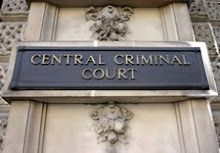No regrets: The juror accused of precipitating the collapse of the £60m Jubilee Line fraud trial by going on strike'
By Adam Lusher
Daily Telegraph 26/03/2005
Neil Robertson, 25, told The Telegraph: "I may well have been the straw that broke the camel's back, but anyone in my position would have done the same."
Mr Robertson, from Earlswood, Surrey, triggered a review of the Jubilee Line fraud trial when he refused to attend the Old Bailey unless the court helped him to resolve a problem with his employer, who claimed that he owed them £9,000 in pension contributions.
He said that he was not aware that he was expected to continue to make contributions into his pension plan out of the loss of earnings payments from the court in lieu of salary. He claimed that the employer's demand was a result of his attending court for 21 months and had threatened his ability to pay his way through Oxford University, where he had been offered a place to study law, starting in October.
Mr Robertson handed Judge Ann Goddard a letter on March 8, which read: "The stress is making me ill. I am not prepared to sit as a juror until this matter is resolved with an assurance that I will not have to pay £9,000 to my employer, a situation which has only come about as a result of fulfilling my public duty."
On March 14, Judge Goddard adjourned the case, asking lawyers to consider the possibility of Mr Robertson stepping down. Patrick Upwood QC, for the prosecution, asked for time to review the progress of the whole trial, which had begun in June 2003 and had already been subject to many delays.
Mr Robertson's letter looked like one stumbling block too many and the review of the case concluded last Tuesday, when Mr Upwood told Judge Goddard that the case had lost vital momentum and had to be abandoned. The case, which is believed to be Britain's longest jury trial, collapsed after 21 months and the spending of £60 million of taxpayers' money, but Mr Robertson, who was juror number nine, said he had no regrets. "I feel that the court has a duty of care to help me resolve this problem," he said. "I want them to take this matter out of my hands and work with my employer to come to an agreement."
Mr Robertson, currently a technical support manager, said that he had made no provision to make the pension contributions. He wanted the court to help him to broker a deal with the employer to delay the payment until he could afford it, probably after graduating. Otherwise he would have to pay it all from his savings and would be unable to afford to go to university.
"That would mean my future had gone," he said. "I wouldn't become a barrister. How could I concentrate on complicated evidence with that going on? I had no other option." He added: "If the court had helped me properly, I would still be sitting. For a £60 million case to collapse because of £9,000 is farcical."
Judge Goddard adjourned the case on March 14, and Mr Upwood asked for time to review the progress of the whole trial, leading to its collapse on Tuesday.
The day before, the court manager had informed Mr Robertson that the Court Service had to pay loss of earnings, but was under no obligation to investigate for jurors what pension contributions that they had to pay employers.
The Court Service offered to pay for legal advice for Mr Robertson "as a wholly exceptional gesture" but he rejected this, complaining that it left him still facing the stress of the £9,000 demand, and refused the call for him to attend on Tuesday.
The subsequent acquittal of Stephen Rayment, 45, Mark Woodward-Smith, 44, Graham Scard, 50, Mark Skinner, 50, Paul Fisher, 52, and Anthony Wootton, 50, led to demands for complex fraud cases to be heard without a jury and prompted Lord Goldsmith, the Attorney-General, to order an inquiry.
Jurors from the trial who spoke to The Telegraph demanded that they be heard at the inquiry. They also revealed the tortuously slow proceedings which began in courtroom 12 of the Old Bailey on June 9, 2003.
One juror, Jeff Garside, 57, said: "On April 1, 2004, I asked for a copy of a letter they [the lawyers] were discussing. The result was the jury didn't return until May 6, when they told us that they still hadn't found the letter - but had discovered several thousand documents they didn't know existed. They had needed time for legal argument."
Mr Garside calculates that between June 2003 and January 2005, the jurors heard evidence on only 140 days. Mr Robertson added that because the problems with the £9,000 were still unresolved, his ability to fund his university studies was still in jeopardy.

No comments:
Post a Comment